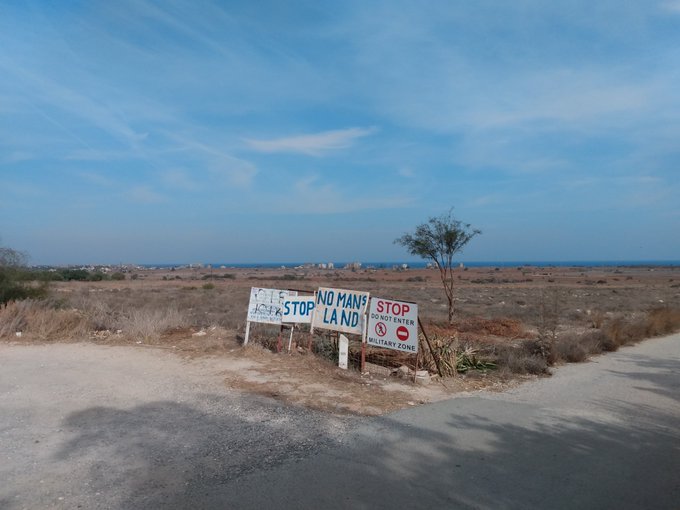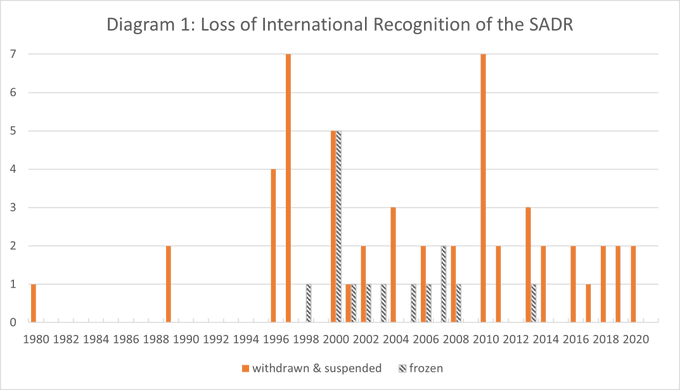Overview of 2021: Elections, Strife, and Suspense
As last year, the De Facto States Research Unit is again highlighting the developments and major events in the lesser recognised world. 2021 was a year of contradictions in international relations. The unrelenting waves of the Covid-19 pandemic kept many societies in a stop-go situation, affecting global trade and travel as restrictions were sometimes discussed, effected, or changed with little warning. On the other hand, the year also made increasingly evident that many powers, both big and regional, are vying for an overhaul of international power dynamics. For de facto states, this situation does not look promising. While some of them were still able to enjoy the relative calm before the storm and prioritize internal agendas, others were already pushed and pulled towards the crossfire as precious pawns. For secessionist regions, such times of power redistribution could be useful, as parent states are distracted, and external support might be found among competitors. Yet here as well, the Covid-pandemic waylaid plans and extended the feeling of suspense and foreboding.
The Republic of Abkhazia
Internal power struggles and political crises shape the year 2021 in Abkhazia. The energy crisis continues throughout 2021, forcing the state to use energy blackouts. The Ingur hydroelectric power plant (HPP), previously the sole energy provider in Abkhazia, is shut down for renovations from January to May, electricity is bought from Russia during that time. The renovated HPP is still unable to fulfil the demand, drive up sharply by cryptocurrency mining. In the summer, the government announces a deal with Gazprom to build a gas supply network by mid-2022. Privatization of smaller, currently unused HPPs is discussed, but the topic of Russian investments, as well as allowing Russian citizens to buy real estate, remains sensitive and politicized. Overall, the implementation of the December 2020 roadmap for increased integration with Russia seems to be lagging, but two key positions in the government – the ministers of foreign and interior affairs – are filled with people previously working for the Russian administration. In May, Bzhania is forced to remove from Abkhazia’s Foreign Policy Concept a paragraph declaring openness to multilevel negotiations with Georgia outside of the Geneva discussions after considerable pressure from the opposition and the parliament. Covid-19 pandemic brings further criticism to the government over their inability to enforce public safety rules, to promote and to secure vaccines. In late September, a confrontation between law enforcement and two MPs during the Victory Day, triggers a long wave of opposition protests. Protests grow over the next months, with the energy crisis, Covid-pandemic, and impartiality of law enforcement agencies and justice system named as key issues. Protesters demand the resignation of various officials (including the president), constitutional changes, and postponement of parliamentary elections to be held in March 2022. On December 21, protests turn violent, although storming of the presidential palace – which brought current president Aslan Bzhania to power in 2020 – is avoided. For the first time ever after such protests, some opposition figures are arrested, and the year ends in a crisis.
The Autonomous Region of Bougainville
While the non-binding referendum of 2019 sees 98% support for independence, Covid-pandemic slow talks with the government of Papua New Guinea (PNG) in 2020, as well as in 2021. Still, several consultations with the PNG central government do take place in 2021. In July, PNG’s prime minister Marape and Bougainville’s president Toroama agree on a timetable for the transfer of most powers to Bougainville by 2023, and to achieve a full political settlement by no later than 2027. However, disagreements remain over the powers of the PNG parliament in the process. Toroama believes the parliament can only ratify the results of the referendum and/or the consultations. Marape insists that the parliament retains the ultimate power in allowing Bougainville’s secession, irrespective of the referendum results. At the heart of this issue is fear that Bougainville’s secession might lead to the breakup of the entire PNG, and Marape is thus looking for a solution that would give Bougainville everything short of actual independence. In a significant victory for Bougainville, mining giant Rio Tinto commits in mid-summer to funding an environmental study on the Panguna mine. What was once among the world’s largest copper and gold mines that brought much profit to the company (but contributed less than 1% of its profits to Bougainville), was abandoned by the company in 1989, when community anger over the environmental damage and profit distribution sparked the civil war. This is seen as an important first step towards remedying the damage caused by the mine.
Donbas (Luhansk and Donetsk People’s Republics)
With Donbas in the middle of Russian and Ukrainian/NATO tensions, active fighting between Ukrainian government forces and Russian-backed rebels along the Line of Contact, as well as Russia’s gathering of troops near Ukraine’s borders gain most attention throughout the year. In March, Ukraine officially acknowledges the end of the July 2020 ceasefire. European Civil Protection and Humanitarian Aid Operations office in Kyiv estimates that about 3.4 million people in Eastern Ukraine need humanitarian aid, many are unable to relocate as the border between Ukraine and the breakaway territories has been closed to civilians since 2020. While the initial closure was related to Covid, it seems to have become more permanent by now. People in Donbas region are increasingly turning to Russia for their needs, from medical services to education to leisure. Passportization has become a competition: both Donetsk and Luhansk People’s Republics are trying to prioritize their documents, planning to phase out Ukrainian documents by 2025. People’s Republics’ documents make applying for Russian passport easier; according to information released in July, more than 600,000 Russian passports have been issued to Donbas people. In September, about 42% of eligible voters from Donbas participated in Russian Duma elections, many of them electronically. Most people supported Russia’s ruling party United Russia, and in mid-July, the leader of DPR, Denis Pushilin, announced he would become member of the party himself.
The Republic of Kosovo
The many elections of 2021 promise to bring some much-needed stability to Kosovo’s political scene. Early parliamentary elections in February bring an unprecedented win for Albin Kurti’s Vetëvendosje, forecasting the formation of a strong government with a parliamentary majority, one that might be able to carry out a full term. In April, acting president Vjosa Osmani is elected to serve a full term. However, local elections in October – held despite a spike in Covid-cases – are a disappointment, as Vetëvendosje cannot win any municipalities outright. A second round is needed in 21 of the 38 municipalities, further cementing the dominance of opposition parties on local level. In September, serious clashes break out in Northern Kosovo, as Kosovo tries to ban Serbian license plates (in a move mirroring Serbia’s own ban on Kosovar plates). Serbia raises the combat-readiness of its armed forces near the Kosovo’s border. On September 30th, an EU-mediated agreement is reached on mutual recognition of license plates, and the situation de-escalates. Overall, however, not much progress is made in the EU-facilitated dialogue between Serbia and Kosovo. Kosovo is also still unable to achieve visa liberalisation with the EU.
Nagorno-Karabakh (Republic of Artsakh)
Clashes between Armenian and Azeri soldiers break out regularly throughout the year, despite the November 2020 tripartite peace agreement and the presence of Russian peacekeepers. There are also civilian casualties. Representatives of Armenia and what remains of NKR reiterate throughout the year that the conflict remains unresolved until NKR’s status is settled. NKR promises to continue fighting for self-determination and recognition, as coming under Azerbaijani control would be unacceptable. In contrast, Ilham Aliyev of Azerbaijan maintains that the question of NKR’s status is closed. Restoration, reconstruction, and resettlement projects are progressing on both sides. Azerbaijan is sparing little expense in developing housing and infrastructure, including new airports and highways. Experimental development plans for the region include “smart villages”, small technologically advanced communities to maximise economic development, as well as “agroparks”, large-scale, government-backed agribusinesses. In NKR proper, rebuilding with the aid of Armenia and the diaspora is also underway, with the displaced people still remaining in the territory mostly pooling into the capital city Stepanakert, despite being extremely vary of the future. In the summer, a heatwave brings with it drought and water shortages, as most of NKR’s water supply is now in the Azerbaijani-controlled territories. Protests do break out in June, but in response to Karabakh president’s support for Nikol Pashinyan upon his re-election, as Pashinyan is considered to have capitulated during the war. Responding to protesters’ demands, President Arayik Harutyunyan promises to resign as soon as the situation is stable enough for holding elections. While Azerbaijan is leveraging its success by making additional demands on Armenia, mostly related to opening old transport links between the two countries and securing the Syunik/Zangezur corridor to its Nakhichevan enclave, Armenia is making additional moves to increase its security. In November, following heavy clashes with Azerbaijan, Armenia claimed it is formally applying for Russian assistance per the 1997 bilateral agreement, in December, it was announced that Armenia and Turkey are starting the process of normalising relations. Meetings between Armenia and Azerbaijan take place in several formations throughout the year, in the tripartite format with Russia, as well as under the aegis of the EU during the Eastern Partnership Summit in December. Yet the OSCE Minsk Group, the previous negotiation format, is declared to be in shadow death by Azeris.
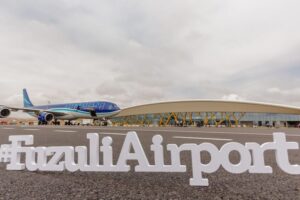
Image: Regional airport in Fuzuli opened in October as part of Azerbaijan’s “revival of the liberated territories” (Source: Trend News Agency)
The Special Collectivity of New Caledonia
On the road to possible independence, the island holds its third independence referendum in December, with previous rounds having taken place in 2018 and 2020. As Covid-19 arrives in the islands in September, indigenous and pro-independence Kanak community is unable to utilise their preferred campaigning methods of village meetings and tours due to lockdowns. Furthermore, Covid-deaths require many communities to follow traditional, lengthy mourning rituals, while French president Macron refuses to reschedule the referendum. As a result, the Kanak community is largely abstaining from the vote, meaning that while 96.5% of voters are against independence in the third round, referendum participation is only 43.9%, significantly down from the 86% of the 2020 referendum. French politicians nevertheless hail the result as marking the end of a 30-year process of preparation and consultation. For Kanaks, the boycott is more about the breakdown of dialogue and recalibration, rather than giving up on their fight for independence; they promise to resume dialogue after the French presidential elections in 2022.
The Turkish Republic of Northern Cyprus
With a new president favouring a two-state solution to the conflict over a federated settlement at the helm, TRNC’s relations with the Republic of Cyprus (ROC) continue to deteriorate in 2021. In July, Turkish president Erdoğan visits on the anniversary of the Turkish invasion to Cyprus, and once again pledges to open up and potentially resettle a part of Varosha – a move in contradiction with UN resolutions. The speech draws criticism from the international community, as it is feared it might flame ethnic tensions on the island. In August, the Greek Cypriot government announces that in light of TRNC’s steps and rhetoric, it will rescind the passports of 14 senior Turkish Cypriot officials. The move angers TRNC’s government, but also draws criticism from ROC’s own opposition forces. Relations between Northern Cyprus and Turkey sour in the second half of the year. In October, a blacklist of 42 Turkish Cypriots banned from entering Turkey emerges – all those on the list are critical of Erdoğan and favour reunification of the island. The destabilisation of the Turkish lira hits the economically dependent TRNC hard, raising support for the unilateral adoption of the EURO. By early 2022, public protests are mounting over Turkey’s oversized influence on the island, and support for reunification of the island is once again growing. This, however, comes at the time when the UN Secretary-General Antonio Guterres warns that the possibility of securing a negotiated settlement in Cyprus, or even to have meaningful negotiations, is at a low point.
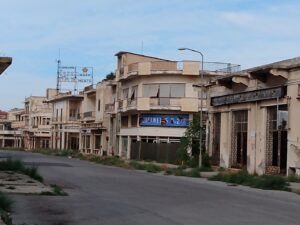
Image: Boulevard of “Broken Dreams” in Varosha (Source: Eiki Berg)
The State of Palestine
Both Israel and Palestine are supposed to hold elections in 2021. Israel’s parliamentary elections – fourth in two-year’s time –, do take place in March, allowing for a new, if somewhat unlikely coalition to finally oust political heavyweight Benyamin Netanyahu in June. Palestine’s president Mahmoud Abbas, however, “indefinitely postpones”, first the legislative elections, then the presidential elections. Local elections do take place in the West Bank in December, although many are angry about the election organisation and Hamas is blocking the vote. In April and May, tensions between the Jewish and Arab communities in Jerusalem start to ramp up, culminating with a two-week bout of conflict in May. In response to the initial conflict between Muslims and the Israeli police, militants in Gaza start firing rockets into Israel. Israeli Defence Forces respond with operation “Operation Guardian of the Walls”, heavily bombing what are claimed to be HAMAS targets in Gaza. International community repeatedly calls for a ceasefire, a deal is brokered by Egypt, Qatar, and the UN on May 20th. The conflict kills about 260 Palestinians and 13 Israelis, World Bank estimates from July show that Gaza sector would need up to 485 million dollars over the next two years for recovery. The international community is increasingly critical of Israel’s actions towards Palestine, prominent domestic and international NGOs are openly framing the situation as apartheid, as there is no functional Palestinian self-rule against Israel’s primary authority. In February, the International Criminal Court’s Pre-Trial Chamber rules that the ICC has the jurisdiction to hear war crimes cases against Palestinians and Israelis; in May, the United Nations’ Human Rights Council approves an open-ended investigation into Israeli war crimes. In October, Israeli Defence Minister labels six Palestinian civic organisations as terrorist entities, another move criticised by the international society. The US re-establishes ties with the Palestinian Authority, holding a virtual meeting to renew the joint Economic Dialogue (USPED).
Sahrawi Arab Democratic Republic (Western Sahara)
Hostilities between the Sahrawi Arab Democratic Republic’s Polisario Front and the Moroccan government are overall relatively small-scale, but certainly re-ignited in 2021, leading the UN Secretary-General Antonio Guterres to call the setback over the past year significant and not conducive to achieving a political solution. In October, the president of the Sahrawi Arab Democratic Republic, Ibrahim Ghali, promises to continue the attacks until Western Sahara is granted a self-determination vote. Other states pick sides as well. Notably, in early 2021, Spain allows Ghali to be treated for Covid-19 in Northern Spain, drawing Morocco’s ire. In May, Spain’s North African enclave Ceuta, accessible through Morocco, experiences a sudden influx of 8000 migrants attempting to gain entry to the EU. Spain calls Morocco’s actions of not instigating border controls a show of disrespect towards both Spain and the EU. In October, Morocco deports two Spanish human rights lawyers and a doctor, arriving in Western Sahara on a Spanish and UN-sanctioned humanitarian mission. This might also be an action against both Spain as well as the EU, whose Court of Justice has just days earlier cancelled two agricultural trade agreements with Morocco concerning the disputed region, ruling that Morocco does not have the consent of the local inhabitants to take on obligations on their behalf. In August, Algeria severs diplomatic ties with Morocco, amidst a flurry of accusations. In September, Peru announces the resumption of diplomatic relations with Western Sahara, frozen since 1996. A few days later, Bolivia also re-establishes diplomatic ties with Western-Sahara, after suspension in early 2020. Biden’s administration, however, does not comment on Trump’s tweet from the end of his term in 2020, announcing US recognition of Morocco’s sovereignty over Western Sahara.
Scotland
Early in 2021, Scotland’s quest for independence is formally tied to the outcome of the Scottish parliamentary elections taking place in May. The ruling Scottish National Party announces that, should pro-independence parties win, the government will pass a bill allowing a new referendum. In March, the Scottish Government introduces a draft Independence Referendum Bill. This decision puts Scottish independence once again to the centre of the electoral debates. The election results in a third successive pro-independence majority with almost 56% of the votes going to parties supporting independence. The UK Government, however, still holding the power to approve a referendum, is consistently refusing to allow a second referendum to take place. Despite this, Nicola Sturgeon states in September that her government intends to hold a referendum by the end of 2023, pandemic situation allowing. Public opinion polls in Scotland continue to show that the wider population is almost evenly divided on the issue, with no clear and sustained majority for either side. Additionally, Scotland gains international attention in November, as Glasgow is the host city of the 26th United Nations Climate Change Conference.
The Republic of Somaliland
Parliamentary and local council elections take place on May 31. While local council elections have been previously held two times, these are only the second parliamentary elections since 2005. Three parties are in the race, and the results are quite close. In the end, two of the parties, populist Waddani and the centre-left UCID, form of a political alliance for governing, side-lining the previously ruling, liberal Kulmiye Party. Somaliland, like much of the wider region, is also heavily impacted by recurrent droughts. Consequently, many people living in pastoralist communities are forced to move to internally displaced persons sites in efforts to cope, and the humanitarian situation is rather grave. While the Covid-19 pandemic aggravates the situation and lockdown measures introduced in 2020 disrupt regular lives, the pandemic is also bringing some unexpected relief in the form of a digital disruption, allowing for a smaller drop in remittances than anticipated at the outset of the pandemic.
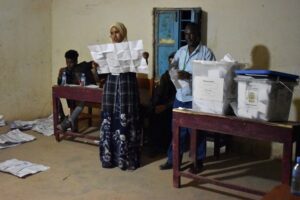
Image: Reading the results out to other polling station staff, domestic and international observers in the 2021 elections (Source: Scott Pegg)
Republic of South Ossetia – the State of Alania
South Ossetia, somewhat similarly to Abkhazia, also faces drawn-out political crises throughout the year. The crisis that starts in 2020 after a man dies of torture in police custody, extends to 2021, and the parliament remains at an impasse for the first few months, as 14 out of 32 MPs boycott the sessions and demand the dismissal of the Prosecutor General. The authorities respond with a public relations campaign targeting boycotters. Despite lacking a quorum, the state budget for 2021 is passed in February, raising the issue to a constitutional crisis. The deadlock comes to an end in March as opposition MPs re-join the parliament and the new prime minister can be sworn in. Thereafter president Bibilov announces the need for constitutional reforms and raises hopes for decentralisation of power. In September, a social media post showing a meeting between Afghanistan’s Deputy Prime Minister and the one who is claimed to be a representative of South Ossetia is published. The representative is identified as Alexei Maksimov, a Russian citizen most recently serving as the South Ossetian Foreign Intelligence Service’s representative to the Russian counterpart. Notably, South Ossetian administration does not comment on why Maksimov was meeting with Taliban, and who exactly was he representing. In November, a new crisis erupts, and president Bibilov faces accusations of surrendering national interests of South Ossetia over the issues of border demarcation. The issue lies in which maps should be used as the basis for this to ensure maximal territorial gains, but still maintain validity vis-à-vis Georgia. The opposition, once again, demands resignation of Bibilov, although presidential elections are scheduled to be held in April 2022.
The Republic of China (Taiwan)
Tensions between China and Taiwan continue to rise through 2021: while China is increasingly vocal about its determination to take control of Taiwan, the latter is increasingly clear it would rather not, especially as China’s actions in Hongkong show that its promise of “one country, two systems”, is not to be trusted. China uses a variety of coercive measures. In February, China bans the export of Taiwan’s pineapples over quality concern. Taiwan’s president Tsai Ing-Wen makes a public call for people to eat more pineapples. In September, China does the same with Taiwanese apples. China also ramps up its warplane excursions to Taiwan’s airspace, especially since October. Taiwan counters by scrambling to mobilize its own fighter jets, although training accidents plague the force. China also uses political pressure. As Taiwan experiences its most severe drought in half a century, Chinese officials and state-led media criticise Taiwan’s handling of the crisis and claim it is proof that Taiwan would not be able to manage without China. Externally, China keeps working hard on removing Taiwan’s remaining diplomatic allies – with Nicaragua switching its recognition to China in December, Taiwan is down to 14 official recognitions, mostly from small countries. Honduras is likely to make the switch in 2022. The lack of official diplomatic recognitions is somewhat offset by the increasingly public support from several Western nations. In the US, support for Taiwan is currently one of the only issues that has bipartisan support, and a proposal for a 750 million USD weapons sale is announced in August. While several European states send delegations to Taiwan, it is Lithuania that, upon allowing Taiwan to open a trade mission under its own name, draw’s China’s ire, resulting in the downgrading diplomatic ties between China and Lithuania. Taiwan shows its gratitude by launching a 200 million dollar investment fund, as well as another billion-dollar credit fund for joint projects.
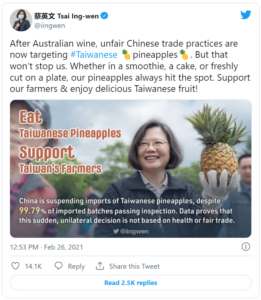
Image: Taiwan’s president turned Chinese sanctions into a public matter (Source: Twitter)
Pridnestrovian Moldovan Republic (Transnistria)
In September, many eyes all over Europe turn to Transnistria for an unexpected reason: FC Sheriff Tiraspol is not only playing its first ever season in the Champions League, but also wins one of its first games against heavyweight Real Madrid, in what could be described as a David versus Goliath match. Although the club is unable to repeat this success in later games, the increased profile and exposure is a boost for Transnistria itself, as well as for Sheriff, the controversial and monopolistic holding company in control of much of Transnistria. Transnistria’s most and least intriguing political issue of the year is the presidential election on December 12. While it is no surprise that the incumbent president Vadim Krasnoselsky (Sheriff’s favourite) is re-elected, with a reported 79% vote share, the question of who would run against him allows for some anticipation. However, most competitors are eliminated for various reasons before the election day. In the end, only one competing candidate remains, farmer and clerk Sergey Pinzar. Voter turnout remains low, around 35%.
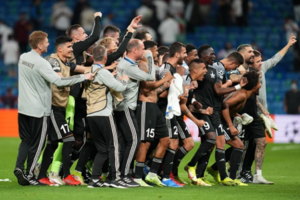
Image: FC Tiraspol after their win over Real Madrid (Source: Pressinphoto/Icon Sport via Getty Images)
Author: Kristel Vits


